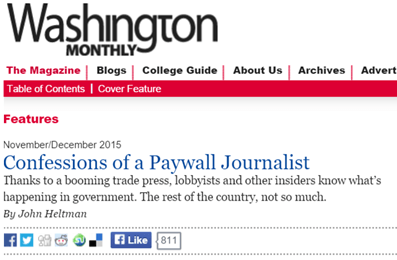 Think you’re reading less meaty reporting out of D.C about the nuts and bolts of government? Well, it isn’t your imagination.
Think you’re reading less meaty reporting out of D.C about the nuts and bolts of government? Well, it isn’t your imagination.
While newspapers are faltering partly due to advertising competition online, specialized news services for elite law firms and lobbyists are taking off. And in terms of industry priorities, this turns out to be a somewhat of a zero-sum game.
In a Washington Monthly article, John Heltman shares the ugly details. Got a few thousand dollars or more a year to spare? I suspect that’s what subscriptions would cost in many cases.
Draconian copyright laws and related ones have long been a burden on users of e-books (for example, the ban on circumvention of DRM even for backup purposes). But now consider the potential impact on democracy itself if in the future the copyright lobby succeeds in rolling back fair use and it’s harder for information from pay-walled newsletters to seep out.
Please don’t discount the possibility. Bought, bought, bought—that’s Washington, so often up for grabs by the highest bidder.
Meanwhile I can’t blame newspapers or trade journals for putting up pay walls when conditions leave them with no other alternative. Perhaps, however, as one way to mitigate this somewhat, we ought to be thinking about a national newspaper endowment to help subsidize investigative reporting and other kinds at local, state and national levels. Unlike a national digital library endowment, this one should not be a government agency (some with similar ideas might disagree). Day-to-day reporting offers more temptations for politicians to meddle than library activities do. But one way or another, we need to do something.
“In pursuing this story,” reports Heltman, “I analyzed the Congressional Directory from the 101st Congress (1989-1991) through the 113th Congress (2013-2015), counted how many reporters were listed in each bureau, and categorized each bureau as either a newspaper, newswire, trade publication, foreign bureau, or online publication.
“What I found was that there are roughly the same number of accredited reporters in Washington today as there were twenty-five years ago, but that more of them are working for trade publications and fewer are working for newspapers and newswires.”
The Web site Pro Publica, the investigative nonprofit, offers an illustration of the corrective possibilities here.
Something to ponder: Heltman notes that the amount of money spent on federal contracting more than doubled from $206 billion in fiscal year 2000 to $537 in 2011. Washington-style paywall journalism helps empower the already-powerful to grab still more of Americans’ tax dollars.

































